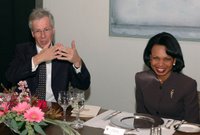on Monday night passed, Council ignored one of its own resolutions - as well as the by-law on conflict of interest described below. That motion, passed in 2002 mandated that council send the issue of salaries to an independent panel before each election and that the incoming council would accept the recommendations.
Despite the fact that all but three of the current councilors voted on that motion, none of them paid any attention to it.
In the meeting on Monday night, city officials reminded council of the need to rescind the 2002 motion. They ignored it and carried on anyway.
Meanwhile, the Telly reports that newbie council Ron Ellsworth (whose election campaign expenses are still larger than his newly inflated salary, but only just) will introduce a motion on Monday...to rescind the 2002 motion, not the one every is complaining about.
unrepentant, the Boor Mayor continues to lash out at all those who oppose him.
Grab the Telly. Vintage small town politics.
Sad but true.
_________________
St. John's City Council is in hot water with residents of the capital.
At Monday night's meeting, without putting it on the agenda, providing any form of advance notice, and without mentioning it in the budget at all, councilors voted themselves a retroactive pay hike that will see some of them getting cheques for thousands of dollars.
According to The Telegram, council made the decision without consulting staff or an outside sources. They merely sat around a table, did some quick math and boosted their pay.
It was a unanimous decision. Some councilors, like Shannie Duff ought to have known better that the process council used was pathetically inappropriate. However, given Duff's long career on council it is possible she was overcome by a moment of group-think.
Newbie councilor Ron Ellsworth offered a lame excuse: apparently he works hard. He may work hard, but the method he chose to reward himself is so ridiculous as to defy explanation.
As for Tom Hann, the whole affair beggars imagination. The guy who has railed against council for its secretiveness and for its alleged massaging of the books at Mile One stadium has now simply become one of the people he used to criticize. How quickly he was absorbed into the collective when Andy, Doc and the boys started talking about paycheques.
The guy who was a fixture of the Open Line shows along with Sue and the Moon man has now been struck mute. His silence is deafening. Should Hann pop up on Monday - after he sees which way the wind is blowing - to rescind the motion and offer apologies, citizens of St. John's should take his conversion with a grain of salt.
Keep an eye on him. The salary issue was too obviously wrong and his willingness to go along with it too easy. Hann was elected having spoken out about the need for financial propriety at City Hall. In this instance, the watchdog helped load the getaway van.
The issue here is solely one of process and the process used is wrong.
The process is wrong because council violated its own by-laws by using the method it did.
By-law 103 on conflict of interest to be specific:
3.(1) No member of Council shall vote on or speak to any matter before the Council or any committee thereof where:There is no more direct pecuniary interest than a councilor's own remuneration for the job of serving on council.(a) the member of Council has a pecuniary interest directly or indirectly in that matter; (Amended 97/12/01; #1401)
Conflict of interest is why in every other elected body, the remuneration for elected officials is passed to third parties to decide. Even if council must, by law, vote on its own salary, the salary should be set by someone other than council and adopted without debate.
The question now remains what to do.
Council has no choice but rescind the motion granting the raises. Who better to do it than Doc O'Keefe, the deputy mayor. To do otherwise would merely confirm that council behaves exactly as they have been accused of behaving: without regard to the law.
Once rescinded council should appoint a panel of three persons - none of them being former councilors - and give them 30 days to report on a new method of setting council remuneration from this point forward. Under no circumstances should council grant retroactive pay and under no circumstances should citizens have to deal with this spectacle again in four years' time.









